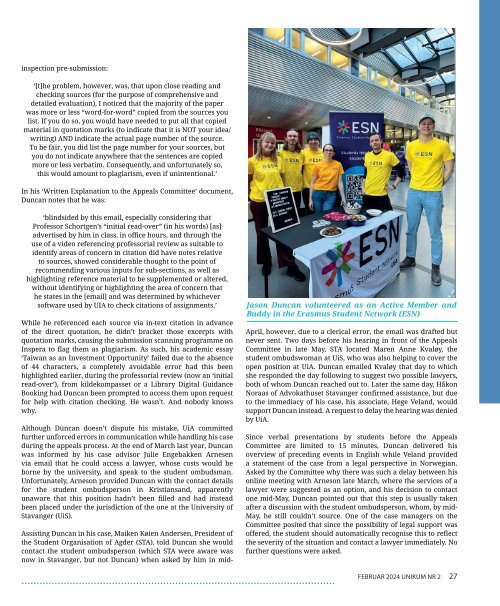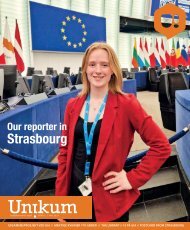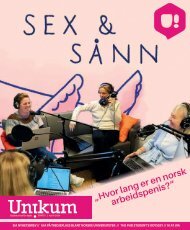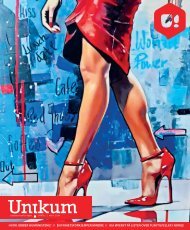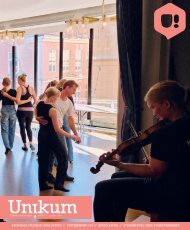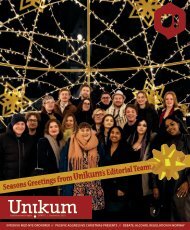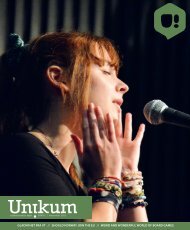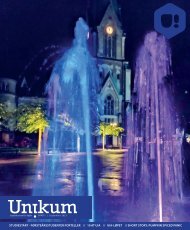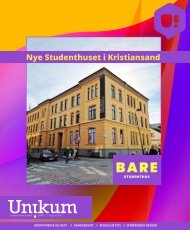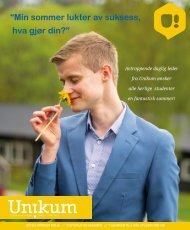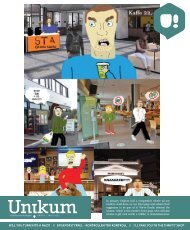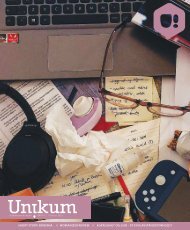FEBRUARY24_UNIKUM_WEB
Create successful ePaper yourself
Turn your PDF publications into a flip-book with our unique Google optimized e-Paper software.
inspection pre-submission:<br />
‘[t]he problem, however, was, that upon close reading and<br />
checking sources (for the purpose of comprehensive and<br />
detailed evaluation), I noticed that the majority of the paper<br />
was more or less “word-for-word” copied from the sources you<br />
list. If you do so, you would have needed to put all that copied<br />
material in quotation marks (to indicate that it is NOT your idea/<br />
writing) AND indicate the actual page number of the source.<br />
To be fair, you did list the page number for your sources, but<br />
you do not indicate anywhere that the sentences are copied<br />
more or less verbatim. Consequently, and unfortunately so,<br />
this would amount to plagiarism, even if unintentional.’<br />
In his ‘Written Explanation to the Appeals Committee’ document,<br />
Duncan notes that he was:<br />
‘blindsided by this email, especially considering that<br />
Professor Schortgen’s “initial read-over” (in his words) [as]<br />
advertised by him in class, in office hours, and through the<br />
use of a video referencing professorial review as suitable to<br />
identify areas of concern in citation did have notes relative<br />
to sources, showed considerable thought to the point of<br />
recommending various inputs for sub-sections, as well as<br />
highlighting reference material to be supplemented or altered,<br />
without identifying or highlighting the area of concern that<br />
he states in the [email] and was determined by whichever<br />
software used by UIA to check citations of assignments.’<br />
While he referenced each source via in-text citation in advance<br />
of the direct quotation, he didn’t bracket those excerpts with<br />
quotation marks, causing the submission scanning programme on<br />
Inspera to flag them as plagiarism. As such, his academic essay<br />
‘Taiwan as an Investment Opportunity’ failed due to the absence<br />
of 44 characters, a completely avoidable error had this been<br />
highlighted earlier, during the professorial review (now an ‘initial<br />
read-over’), from kildekompasset or a Library Digital Guidance<br />
Booking had Duncan been prompted to access them upon request<br />
for help with citation checking. He wasn’t. And nobody knows<br />
why.<br />
Although Duncan doesn’t dispute his mistake, UiA committed<br />
further unforced errors in communication while handling his case<br />
during the appeals process. At the end of March last year, Duncan<br />
was informed by his case advisor Julie Engebakken Arnesen<br />
via email that he could access a lawyer, whose costs would be<br />
borne by the university, and speak to the student ombudsman.<br />
Unfortunately, Arneson provided Duncan with the contact details<br />
for the student ombudsperson in Kristiansand, apparently<br />
unaware that this position hadn’t been filled and had instead<br />
been placed under the jurisdiction of the one at the University of<br />
Stavanger (UiS).<br />
Assisting Duncan in his case, Maiken Køien Andersen, President of<br />
the Student Organisation of Agder (STA), told Duncan she would<br />
contact the student ombudsperson (which STA were aware was<br />
now in Stavanger, but not Duncan) when asked by him in mid-<br />
Jason Duncan volunteered as an Active Member and<br />
Buddy in the Erasmus Student Network (ESN)<br />
April, however, due to a clerical error, the email was drafted but<br />
never sent. Two days before his hearing in front of the Appeals<br />
Committee in late May, STA located Maren Anne Kvaløy, the<br />
student ombudswoman at UiS, who was also helping to cover the<br />
open position at UiA. Duncan emailed Kvaløy that day to which<br />
she responded the day following to suggest two possible lawyers,<br />
both of whom Duncan reached out to. Later the same day, Håkon<br />
Noraas of Advokathuset Stavanger confirmed assistance, but due<br />
to the immediacy of his case, his associate, Hege Veland, would<br />
support Duncan instead. A request to delay the hearing was denied<br />
by UiA.<br />
Since verbal presentations by students before the Appeals<br />
Committee are limited to 15 minutes, Duncan delivered his<br />
overview of preceding events in English while Veland provided<br />
a statement of the case from a legal perspective in Norwegian.<br />
Asked by the Committee why there was such a delay between his<br />
online meeting with Arneson late March, where the services of a<br />
lawyer were suggested as an option, and his decision to contact<br />
one mid-May, Duncan pointed out that this step is usually taken<br />
after a discussion with the student ombudsperson, whom, by mid-<br />
May, he still couldn’t source. One of the case managers on the<br />
Committee posited that since the possibility of legal support was<br />
offered, the student should automatically recognise this to reflect<br />
the severity of the situation and contact a lawyer immediately. No<br />
further questions were asked.<br />
FEBRUAR 2024 <strong>UNIKUM</strong> NR 2 27


